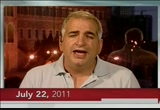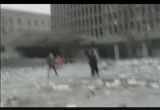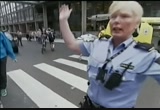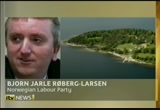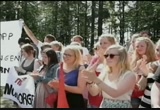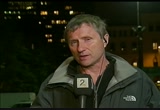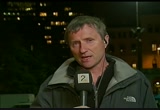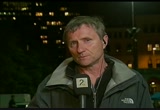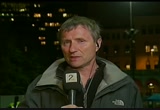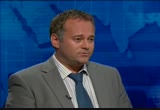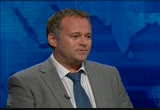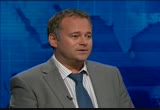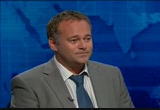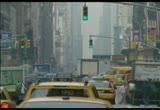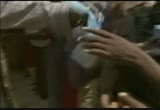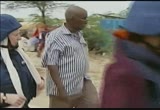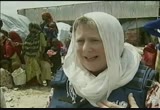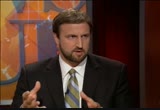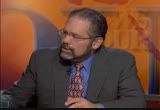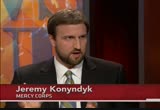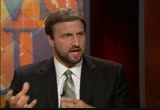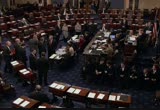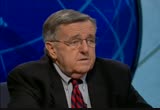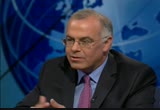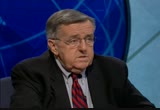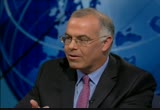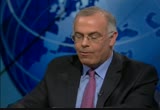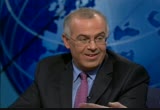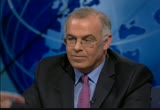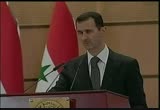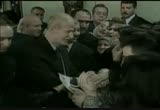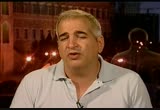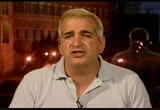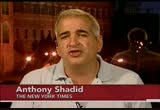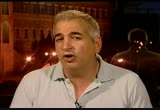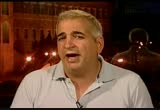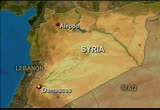tv PBS News Hour PBS July 22, 2011 6:00pm-7:00pm EDT
6:00 pm
captioning sponsored by macneil/lehrer productions >> lehrer: there were two deadly terror attacks today in norway, the worst violence in that country since world war ii. good evening. i'm jim lehrer. >> woodruff: and i'm judy woodruff. on the newshour tonight, we have the latest on the bomb blast that ripped open government buildings in the heart of oslo, and the shootings at a political camp for teenagers. >> lehrer: then, from somalia, we have a report on the worst drought in a generation. and ray suarez examines the effort to get food to millions at risk of starvation. >> we're hopeful that we can push further into southern
6:01 pm
somalia in the coming days an weeks. we have to try. we can't not try. it's just too serious. >> woodruff: kwame holman updates the impasse over getting a deal to reduce the deficit and avert a government default. >> lehrer: mark shields and david brooks analyze the week's news. >> woodruff: and jeffrey brown gets a rare inside look at a syrian city where anti- government demonstrations have grown bigger and bolder from anthony shadid of "the new york times." >> reporter: hama is syria's fourth largest city. it's a significant place, and since last month when security forces withdrew, you've seen, i think, a notion of freedom emerge there. >> lehrer: that's all ahead on tonight's newshour. major funding for the pbs newshour has been provided by: >> well, the best companies are driven by new ideas. >> our future depends on new ideas. we spend billions on advanced technologies. >> it's all about investing in the future.
6:02 pm
>> we can find new energy-- more, cleaner, safer and smarter. >> collaborating with the best in the field. >> chevron works with the smartest people at leading universities and tech companies. >> and yet, it's really basic. >> it's paying off every day. the william and flora hewlett foundation, working to solve social and environmental problems at home and around the world. >> and with the ongoing support of these institutions and foundations. and... this program was made possible by the corporation for public broadcasting. and by contributions to your pbs station from viewers like you. thank you. >> woodruff: at least 17 people were killed today in two terror attacks in norway. so far, one person-- a norwegian man-- has been arrested.
6:03 pm
in the first attack, a bomb exploded outside government buildings in oslo, where at least seven people died. ten more were killed in the second attack, on a nearby island, when a gunman opened fire at a youth camp. we begin with a report narrated by lindsey hilsum of independent television news. >> fear in his voice, death on the streets of oslo. anywhere this scene would be shocking. in peaceful norway it is stunning. but for norway there was more horror to come. on a peaceful island near the capitol, the scene of a massacre. the bodies of more than a dozen people, motionless on the shore. a double mass murder, connected, say police. but who did this? >> this is just minutes
6:04 pm
after the explosion and the very heart of the capitol. there's been a bomb but no one you're seeing knows where it came from or what might happen next. this is the very heart of norway's political life. government buildings, newspaper offices. there's glass and rubble everywhere and shop survivors who think there might be a second bomb. >> the buildings were on fire. it was complete chaos in the streets. we saw injured people being carried out of the buildings. we saw some injured and bloody people walking themselves. >> reporter: norway's police say seven people were killed here. hospitals report more than 100 walking wounded. the prime minister's office's office is also here, though he was not. as police were dealing with this, news came through from this island utoya near oslo.
6:05 pm
there were panicked phone calls from this campsite where hundreds of young people had gathered for a weekend organized by the ruling labour party. a gunman with a bulletproof jacket had opened fire. >> when a policeman showed up at the boat going to the island, telling that he was part of the security system to take care of the security on the island. people accepted that. but only a few minutes after he had come to the island, he took out a handgun and started to shoot. >> reporter: this was the scene not long ago. police marksmen arriving by boat. not far from them, a scene of carnage. the bodies of young people scattered on the shore. no signs of movement in the water, people are swimming for their lives. >> some of them you could see really clearly where the bullets had gone in. some of the wounds were really, really, really big.
6:06 pm
some of them had, you know, they had been running for their lives. they had their bones broken. some of them, you know, they were full of blood and dirt. >> reporter: this was the youth camp last year. norway's prime minister visiting. he was due at the camp tomorrow to give a speech. this was the youth camp just yesterday. these young people, the targets of an attack that has come out of the blue on a sunny summer's day, a day of horror, so far unexplained. >> woodruff: president obama extended his condolences to norwegians today, and offered american assistance with the investigation. for more on all this, we're joined by ahnders tvegard of norwegian public broadcasting. we thank you both.
6:07 pm
and i'm going to go to you first, in oslo. what is the latest that's known on the casualties, dead and injured? >> yeah, what they are telling about what happened out on the island, they have so far said that there are ten casualties at the island but they are not ruling out that there can be some more people that are being killed out there. they are even found some bomb-like items out there. and they are searching, still searching the area. and they are fearing that the toll from the island will arrive. here in oslo they have so far counted seven deaths and that is probably not going to rise, yeah, further. >> woodruff: and perhaps 100 or more wounded? >> oh, yeah, a lot of people.
6:08 pm
some seriously wounded. they are in hospitals now, like ten people severely wounded. but there is a lot of people that made themselves to the hospitals and with not that hard injured, actually. but there have been hundreds. i came to the place just after the bomb went off. and i met a lot of people just running towards me with blood running from their faces and wounds, other places on their bodies, in shock. it was-- it was unbelievable scene, actually. yeah, it is a really sad day in norway. >> woodruff: the police at this point have a suspect in custody, just one? >> yeah, there is one guy. he was seen in oslo, the bomb exploded local time 3:30. two hours later the same guy,
6:09 pm
they believe, came up to this island and was taken by boat out to the small island. the island is actually owned by the social democratic youth organization. they are having a traditional youth camp there every year. they had-- it's the same. and the prime minister usually visits the island. i was there to cover sort of the political happenings there. and we left the island only two hours before the shooting started. >> woodruff: and what are police saying about the suspect? who he is, what the motive might have been? >> they are have no motive and they are not released very much information about him. he's 32 years old. he's a white norwegian guy. police have been asked is he known by the police from before. but they said we don't comment on that yet.
6:10 pm
so the only thing i know about this guy is what i said, 32 years old, white norwegian guy. >> and do the police say they're still looking for others? >> yeah, out at the island they have counted ten casualties but they are not ruling out that they will be some more. but it's getting, it's dark here in norway now. it will be in a few hours until the lights come up again. but they are still working out at the island. 40 minutes from oslo. >> i meant looking for any other suspects. >> okay, i'm sorry. yeah, they are investigating this now. they are not ruling out anything. they have asked the police, of course, is this the only suspect but they say we don't know.
6:11 pm
this is the only guy that they have caught so far. but they are not ruling out that there may be some more. but he shouldco be a loner. they haven't ruled that out either. so everything will be speculation but so far this is the only suspect. >> woodruff: i will turn now to ahnders tvegard here with me, are you based here with norwegian television. tell me about this camp. it is a political camp for teenagers. what sort of place is it? >> well, it's an annual camp. young people, teenagers come together. they are-- have political background. it's kind of the youth organizational, the labor party which is now in government which has the prime minister. they come there, listen people talk, give them speeches. it's political. they are there for several days. having fun like young people do. and then you have this carnage when somebody comes
6:12 pm
up, starts killing teenagers. >> woodruff: i have to ask you, to see this sort of devastation we saw in oslo at the government building in that area. and to have so far seven casualties, it's remarkably small. is that because it's a quiet time of year? >> well, it's holiday in norway at the moment. a lot of people are off work. and also on a friday evening at 3:00 people tend to go off work early. so the speculation is that at first, who did this. was it somebody who didn't know about how the norwegian society works or was it somebody who wanted to scare us, obviously from what we are hearing now with having the same person going to this youth camp, there must be some kind of political motivation behind this, wanting to go to the sole of the norwegian people. >> woodruff: what sort of history does your country have with terrorist
6:13 pm
incidents of any kind? >> we haven't had any terrorist attacks on norwegian soil for many years. i mean this is the bloodiest attack since world war ii. but there have been a the of threats to norway because we are part of nato. we have forces in international military operations. >> woodruff: afghanistan. >> libya. >> libya, and we are also doing peace facilitation which can make us a target. we have been on sri lanka. we have been in haiti, sudan, lots of places talking to people, which don't necessarily share our views on that. >> woodruff: as you look at these pictures of your home country, what comes to your mind. >> i'm saddened to see the report. you just had here. i live 10 minutes walking distance from the prime minister's office and this
6:14 pm
is a lively part of oslo and knowing that norway has been attacked by somebody, it's hard to understand, all my friends in norway are still in shock. there will be some hard days to come. and we are not sure how to deal with this at the moment. and there are so many unanswered questions. why did they do this? was he alone. is it part of an international terror organization which the police say is probably not. but how can people go to bed tonight. >> woodruff: well, that's a very good question. how can people go to bed tonight. ahnders tvegard here in washington and from oslo, we want to thank both of you. and our condolences to you and your countrymen. >> thank you. >> lehrer: still to come on the newshour: drought and famine in the horn of africa; the standoff on the debt crisis; shields and brooks; and the anti-government protests
6:15 pm
in syria. but first, the other news of the day. here's hari sreenivasan. >> sreenivasan: the long bout of searing weather hit the northeast full force today as the death toll neared 30 nationwide. extreme conditions also lingered across the plains and the midwest. for soldiers in the battle to beat the heat, it was another long day. >> leave your jacket and tie in your office, and you dress with your shirt and pants, and move on. >> sreenivasan: in new york's central park, temperatures hit 100 by early afternoon, accompanied by punishing humidity that made it feel like 116. mayor michael bloomberg warned that increased use of air conditioners and fans could push power usage to an all-time record. >> this, we think, will be the most stressful day on the electric grid in recent history, maybe ever, and what we need is for people to turn their air conditioners to no cooler than 79. it's a little uncomfortable, but not having electricity would be a lot more uncomfortable.
6:16 pm
>> sreenivasan: and the city's beaches offered no refuge. instead, red flags warned swimmers to stay out of the water after a sewage spill into the hudson river. in washington, d.c., those brave enough to venture out hit a wall of hot air-- readings as high as 103. >> actually, we see people running and it's 100 degrees. i don't know how they can do that. i really don't. >> sreenivasan: in fact, emergency room visits were up in much of the country, with people suffering from heat exhaustion and heat stroke. the intense heat also continued over much of the midwest, but cooler air is expected to move across the northern plains this weekend. but the east coast will be sweating it out until early next week. the nation's ban on gays serving openly in the military will formally end in 60 days. president obama gave the official notice today, after pentagon leaders certified that repealing "don't ask, don't tell" won't jeopardize the military's ability to fight. defense undersecretary clifford stanley said the troops are being prepared for the change.
6:17 pm
>> it remains a policy of the department of defence that sexual orientation is a personal and private matter. to treat our members with dignity and respect, and to ensure maintenance of good order and discipline. there will be zero tolerance for harassment, violence, or discrimination of any kind. >> the change >> sreenivasan: the change will take effect on september 20. in the meantime, pentagon officials are trying to iron out legal and technical details. a major bond rating agency has served notice that it plans to rule greece in default. the fitch ratings agency announced its decision today, a result of the eurozone's new bailout for greece. under that agreement, investors in greek bonds are asked to accept new debt at lower interest rates and for longer terms. fitch said the bond holders will take a loss and that constitutes default. on wall street, stocks finished the day with mixed results, but had a winning week overall. the dow jones industrial average lost 43 points to close at 12,681.
6:18 pm
the nasdaq rose 24 points to close at 2,858. for the week, the dow gained more than 1.5%; the nasdaq rose 2.5%. those are some of the day's major stories. now, back to jim. >> lehrer: and to the crisis in somalia, which is facing the worst famine in decades. the united nations warned today 800,000 children could die from starvation. international agencies want to send in more food, but al qaeda- linked militants vowed to block the aid. jonathon rugman of independent television news traveled to a refugee camp just outside the capital, mogadishu. a warning: some of the images in this report are very disturbing. >> reporter: ahmed is eight months old and close to dying of hunger. he lies in the lap of his father, abdi. the pair have traveled for four perilous days to mogadishu from the famine zone of south somalia in what abdi knows is a desperate race against time.
6:19 pm
these one-year-old twins, avshir and nasir, have just arrived, just two of the half a million children the u.n. says are seriously malnourished. the boys' mother says she walked to the capital because there's nothing to live on outside. and she's smiling, because she is lucky to have made it this far. over a thousand infants have been brought to this emergency nutrition center since it opened just a few days ago, their mothers so busy trying to save their children's lives that there's barely time to grieve for the dead children they have left behind.
6:20 pm
this is how our journey begins-- in the only safe mode of transport u.n. aid workers have- - in the backs of armored vehicles manned by peacekeepers from burundi wielding machine guns. through the window, glimpses of the failed capital of a failed state. on the road out of mogadishu, we can see some of the 400,000 refugees living in makeshift camps. first, they fled the fighting; now, it's famine and drought. we reach the badbaado camp where unicef's director for somalia is dressed as if for battle. she can't know how many in this teeming tent city are sympathizers with militants linked to al qaeda. and everywhere, there are men with guns-- militiamen from squabbling rival clans, as well as burundian forces keeping watch in case food queues turn into riots.
6:21 pm
on this pickup truck, there's what looks like a child soldier. he says he's 18; his cousin says he's 13, the latest recruit to somalia's decades old cycle of violence. and if delivering aid amid mogadishu's ruins is difficult, imagine how hard it may prove where famine has been declared. >> reporter: and here's the proof. little boys like saad, aged seven, listless in his mothers arms. she says the islamists tried to stop them from reaching the capital, the fighters apparently in denial about what the u.n. calls the worst humanitarian disaster in the world. tens of thousands are seeking sanctuary in this camp, yet what we've filmed cannot capture the
6:22 pm
scale of this crisis with millions of somalis beyond the reach of anyone's help. >> lehrer: ray suarez has more on the growing humanitarian crisis in the horn of africa. >> suarez: and for that we turn to jeremy konyndyk, policy director for mercy corps, which has approximately 50 to 100 people doing relief and development work in somalia. he was last there in april. and peter pham is the director of the africa center at the atlantic council. jeremy konyndyk, the conditions that we just saw in somalia don't happen overnight. how long have the problems leading up to a u.n. declaration of famine been being up in somalia? >> by the time it gets to the point of declaring famine there's been a whole process of degradation of the economy, of people's ability to support themselves, of resources that have occurred and grown and grown to the point where basically the ability of many, many somalies, of about 11 million people
6:23 pm
across the entire region because we need to remember that ethiopia, an kenya are also suffering similar conditions it gets to the point where those 11 million people searchly have no means what so ever to support themselves. they've lost their crops. they've lost their livestock. they've lost any other means of income. and to a large degree they have either in the case of people in southern somalia, no choice but to either find aid which is scant in that part of the world or to flee. fortunately in ethiopia kenya and some other parts of somalia, they are getting in. >> suarez: weather forecasts and other, crop forecasts came out of the horn of africa what did the international community do? >> i think the international community's response was slow in this case. the u.s. government has been ramping up drastically now and was prepositioning but if you look at the amounts of money that are going in relative to the last significant crisis in the region which was in 2008, what we see in this year in
6:24 pm
terms of donations from the u.s. government and the community, the international community at large are well, well short. we estimate that at this point the international community has given about 1 billion dollars to the drought in the horn of africa this year than it gave in 2008 the last major. >> peter pharm, jeremy mentioned that there are similar crises right now in kenya, jabuti, ethiopia, is one of the key differences that those places have governments? >> yes. somalia has a transitional federal government. the 14th or 15th, depending how you count them, such entity in 20 years. and it's a government in name only it controls virtually no territory, provide those services and about the only thing its ministers are good at is stealing the aid that they get. the last audit report showed that 96% of the aid they received had been stolen. >> suarez: so if you look at a map of the region the problem is concentrated in
6:25 pm
two parts of the lower part of ethiopia, b and lower shabel who is in charge there? >> well, in those areas the shabab which is an umbrella group for an islamic group has some links with al qaeda and other rival groups but clans and others they reign over the area but you have competing clan interests but you don't have a government per se. >> suarez: so how does an aid agency, jeremy, figure out what to do? al shabab has said it won't cooperate without with outside efforts to get food to the suffering. and to be honest, outside governments are not that happy to have to do business with al shabab either. >> well, there is one of the real challenges. international aid groups have been caught between a rock and a hard place when it comes to southern somalia. almost all the other zones in the east african region
6:26 pm
affected by this we can debt to in some form. but there are two sources of blockage as you have identify. one, of course, is the security problems that are posed and the refusal by the militants in southern somalia to allow international aid groups back in. and the other is the policy of many western governments particularly the united states who have really ramped down their aid to somalia in the last few years because of the presence of shabab. we've seen it could lapts about 88% in u.s. funding to somalia from 20089 to 2010, even as other donors around the world kept their funding at basically the same level. so there is clearly an issue with the u.s. government seeing political issues and legal issues with providing aid to somalia. and that's been a significant concern as well. >> well, peter, what do you do in a case like that. no one wants to give aid that they know most of it isn't did going to reach the intended recipient but you also don't want to stand by while tens of thousands of people die either.
6:27 pm
>> the thing you have to do in the case of somalia is step aside from this so-called government and get the aid to the people who need it. work with civil society and there are civil society groups that international aid organizations have in the past partnered successfully with. work with clan elders and get the aid to the people who need it and let's bypass this corrupt government and also bypass the islamists and the extremists and that way marginalize them as well. >> but you can do that? are there ports where you can actually safely unload ships? are there roads where you can run trucks with cargo that won't be waylayed, that won't be hijacked? >> no one is saying this is easy. but the port of mogadishu is open, other ports are open. ads, if you know the terrain, work with local partners, the aid groups are very effective. and the local civil society groups and clan structures are there. we just have to work with, get our head around the idea that we can't always work
6:28 pm
with governments that look like us. we sometimes have to work with traditional authorities and other institution as that do function in settings like this. >> suarez: jeremy one unicef worker on the ground called somalia one of the most dangerous places, if not the most dangerous place to do aid work in the world today is that right? and what makes it so? >> well, i think we need to draw a distinction between the north and the south in this respect. in the north, which is controlled by a variety of groups depending on where you are, including some fairly developed govern-- governments, it is not dangerous at all. there are security lets as you find in any developing country but it's not particularly dangerous for aid workers. it's really concentrated in the south that there are challenges that exist. and we as aid workers, we know that our security depends on the acceptance of the communities that we work in. and peter referred to nontraditional approaches to aid work and i think that's
6:29 pm
what we-- that's our only chance in southern somalia at this point is working very closely with existing local institutions which are still there which have a lot of capacity. and you know, the aid groups and the some alley people want to see aid get to whom it's supposed to get to. they want to see it get to the needy. and so we need to work in a way that makes that possible. the challenge now is for both of the-- both of the obstacles to that both the policy obstacles and security on stam-- obstacles, we need those removed in order to work. >> suarez: jeremy konyndyk, peter pham, thank you both. >> thank you. >> woodruff: next, the debt talks. tofernlt the speaker-of-the house john boehner broke off negotiations with the president. and mr. obama made a rare late fly appearance in the white house briefing room.
6:30 pm
the deadlock in washington deepened after reports had suggested that an overarching agreement might be in the works. newshour congressional correspondent kwame holman has our report on the day's events >> holman: speaker john boehner started the day by scotching any talk that a deal might be near. >> there was no agreement, publicly, privately, never an agreement, and frankly, not close to an agreement. so let me just suggest that it's going to be a hot weekend here in washington, d.c. >> holman: it had been widely reported that the speaker and president obama were making headway on a plan to save at least $3 trillion over the next decade. the plan would involve an array of spending cuts, including curbs on medicare and medicaid. adding new tax revenues to the mix apparently would wait until next year and negotiations on overall tax reform. for any budget compromise to gain traction, the president likely will have to persuade
6:31 pm
democrats at the capitol, as well as his liberal base of supporters, to accept cuts in favored programs. and democrats already are complaining, strenuously, that the president's proposal does not appear to include any immediate increase in tax revenues. vermont independent senator bernie sanders was among those voicing anger today. >> i don't think it's going to be balanced at all. i think it will likely come down very heavily on the backs of the middle class families, the elderly, sick, and the poor. sure, we want to move to deficit reduction. but it's not a big deal/small deal; it's a fair deal, it is shared sacrifice. >> holman: and justin ruben, head of the liberal group moveon.org, denounced what he called a betrayal. in a statement last night, he said: "the democratic base did not work night and day to elect democrats so that they could cave to tea party extremists who are intent on gutting the social safety net." the deadline for avoiding national default is august 2.
6:32 pm
and at a town hall meeting today, at the university of maryland, the president said he can't let that happen, even if it means accepting choices he doesn't like. but he also insisted again that taxes be part of the plan. >> if we only did it with cuts, if we did not get any revenue to help close this gap between how much money is coming in and how much money is going out, then a lot of ordinary people would be hurt, and the country as a whole would be hurt. and that doesn't make any sense. it's not fair. >> holman: meanwhile, senate democrats quickly dispensed with a republican plan calling for a balanced federal budget amendment to the constitution. it passed the house earlier this week, but failed in the senate 51-46. afterward, majority leader harry reid insisted the senate will go no further until it sees the results of the president's negotiations. >> there are talks going on between president obama and speaker boehner. i wish them well. we await their efforts.
6:33 pm
i'm told there'll be revenue measures in that. if that's the case, we know constitutionally the matter must start in the house of representatives. >> holman: but boehner fired back this afternoon, from the floor of the house. >> the senate majority leader says that they won't offer a plan to cut spending or a plan to raise the debt limit. frankly, that's irresponsible. mr. speaker, where's their plan? president obama talks about being the adult in the room. where's his plan to cut spending and to raise the debt limit? he said in a letter to house republicans that mr. obama still was too focused on raising faxes. he said he would try to negotiate instead with senate leaders. in turn mr. obama had his own say in the white house briefing room. >> i have been lead to the alter now a couple of times. and i think that one of the questions that the republican party is going to
6:34 pm
have to ask itself is can they say yes to anything. >> the president said he's calling democratic and republican leaders to the white house tomorrow morning to seek a way forward. >> lehrer: and to the analysis of shields and brooks-- syndicated columnist mark shields, "new york times" columnist david brooks. mark, tell us what's going on? >> jim, what you've just seen is the rupture of the summit. this had been a summit deal, involving the speaker of house, a republican and the democratic president of the united states. nobody else had been really party to it other than eric cantor, the republic house leader. but the democratic leadership, the house and the senate were not party to it. nor were the republicans in the senate. so it came down, he said-- he said break up and the time is now short. i mean the grand deal appears to be in shamables. and now the urgency is to
6:35 pm
raise the debt ceiling and get it done. >> lehrer: what do you think happened? >> shambles, a complete meltdown, apparently. i've never seen a presidential press conference with the president so angry in public. and you know, i sort of think he's maybe mostly right on substance. he laid out apparently in the next few hours they are he going to be laying out the details of what the white house offer was. there were a lot of revenue cuts, there were spending cuts there were entitlement cuts, revenue increases, so if those are real, then i think it was a pretty good deal. but the president's tone of being the only adult in washington, everyone else is a child, that he's going to summon people to the white house as if they are kindergarteners, even if you agree on the substance, it's kind of hard to go along with someone who is insulting you all the time. so i think the president took a big risk. maybe we will see his tone as he is giving it to them, angry, treating them like children. but a lot of people will take a look at it and say there's some arrogance and self-superiority there. >> rooney: . >> lehrer: well, it's 6:36
6:36 pm
as we're speaking eastern time and the president's still speaking. in the white house briefing room. but he says, mark, that he's going to-- he called the bipartisan congressional leadership to the white house tomorrow, saturday for a meeting. but boehner says he's not negotiating, what's going on? that's what i am trying to get. we don't know. >> well, john boehner said he himself was going to now negotiate with the leaders of the senate. and to try and come up with something. that was in his statement. so but the president did say, not to come from me, he said be at the white house tomorrow morning at 11:00 and come up with a solution. it's up to you. i know the best of my knowledge harry reid and mitch mcconnell and nancy pelosi have not been-- or citizenee huher have not been a party to this. and it's-- so you know, i don't know how they are supposed to come up with who
6:37 pm
the solution between now and 11:00 tomorrow morning but that was the president's ultimatum. and i do think, jim, that it probably raises the ante and makes greater the likelihood that mitch mcconnell harry reid compromise has new legs and new-- . >> lehrer: for the record the president just left the white house briefing room having-- but the gaj of six now, everybody is very optimistic were that. we had two of the members on last night and they said hey, we're the only guys in play here. the only people who have a plan on the table. it looked like that was going to be-- there was going to be peace in our time. do you know what happened with that? >> well, i think it-- the gang of six plan was vague enough but it-had an outline of essentially where they were going. if the president's right then his offer was to the right of where the gang of six was.
6:38 pm
and if the house republicans rejected that, then the gang of six would surely not be acceptable because the gang of six included a lot more revenue than what the president says he's offered. we're not sure what he really offered so we don't know the details but if they rejected what obama was offering, believe me the gang of six was not going to be acceptable for house republicans. >> lehrer: boehner said in his written statement was that it's all about taxes. the president is emphatic that taxes have to be raised. as a former small businessman i know tax increases destroy jobs and that's what he hung it on. and that's been the issue from the very beginning, has it not? >> it has certainly been the issue for republicans. >> that's what i meant. >> and john boehner according to all reports and reporting, was more open to considering leff new being raised by closing down tax expenditures and tax loopholes. >> not raising tax rates or anything. >> that's right.
6:39 pm
>> that's ver bot imfor republicans. and for some you can't even raise revenues but john boehner was -- in rack difficult discussions with that. so we'll now find out, you know, how it broke up why this marriage can't be saved. you know, what, you know who walked out on whom. >> if i could just think where we're headed. because i don't think, if the president says come here tomorrow and submit to me your plan, that's not going to happen. they're not going to be willing to be treated like that. so nothing is going to happen tomorrow. and so maybe we'll get to the mcconnell reid. a lot of house republicans signed a letter. >> explain that. >> it is too complicated to explain and understand but essentially it is a very complicated set of procedures which allow republicans to raise the debt without ever actually voting for it and it gives the democrats a lot of uncomfortable votes. >> and the president essentially has the power to do it. >> and hands a lot of authority, it does fog but
6:40 pm
kick the condition down the road. the second offer and more likely solution to all this is some sort of minimal just okay, we'll take what we can get. and they are sort of 500 million over ten years of cuts sitting on the table. and that would be the default position which we may fall back to. the problem with that is the rating agencies have said or at least one of them have said that's not enough. if you don't really cut 4 trillion then we're going to downgrade your debt and interest costs will then rise for a lot of us. and so that is the most likely 34ri9 call solution. it maybe a disastrous financial solution. >> is there a stench of this kind of political gamemanship here rather than hard held philosophy and ideaological and policy differences? >> well, i think, jim, it's been a mud fight right from ginting. it's been an unappealing, unappetizing spectacle. the president had an edge over the republicans in measures of public opinion
6:41 pm
as casting himself as the grown-up and caring more about compromise and more willing to compromise. but neither side was really being elevated to mt. rushmore status throughout this whole process. it's been-- i think it's hemorrhaging confidence in washington earnings in the federal government, in our ability to act maturely and responsibleably together. so i, i think it's been a loss all the way around and now we're down to the point of, we're scaring staring write down the barrel of august 2nd. >> is it conceivable that they will not make a deal or they'll make it in such a way that the government of the united states of america will actually go in to default? >> i had been going in thinking there was a 10 or 20% chance, now i move that up to 30 or so. i wouldn't say it's likely but i think it's entirely likely. the atmosphere now which we saw today is so poisonous. i think the republicans have been way too rigid on
6:42 pm
substantive grounds. but if you are's going to have a negotiation there has to be a set of demeanors. you have to get people to want to help you. and if you insult them continually t makes it hard even if you have the substance on your side and i think the president did nobody any favors with this press conference. i wish they had said you're hot right now. have a press conference tomorrow. >> lehrer: would you go 30%, would you go with david on 30% possibility. >> i still am just, made of optimism, just insist that in the final analysis they're not partisans, they're grown-ups, they're americans and they know how far how grave. >> lehrer: then why are they acting the way they're acting? >> jim, that's a question that i don't have the answer for. i mean i will say this, that as long as you have the kind of negotiations we had between just the president who say democrat and a speaker who is republican, nobody else on either side had a stake in these negotiations. i mean in time of transparency these were
6:43 pm
totally untransparent. we don't know. all we have is the testimony. but the old adage is for a president f you want people to be with you on the landing, they'd better be in on the takeoff. and you talk to democrat after democrat, they were all in the dark. leadership, nonleadership. and there was really a resentment about what was going on. >> at least on the senate side there really was a desire to do something. you had the gang of six. one of them, there were 53 senators in the room when they were unveiling that. and one of them said this is the best day i have had in the job in a year because we are talking substance and were so happy to be behaving like legislators there was that to be tap mood but so far that has been sideswiped. >> lehrer: is it possible, i'm cust speculating here, and will let you all answer the question, that the real game now, the real goal now is there will be some deal but who gets the most blame
6:44 pm
or gets the most credit. if any. i mean is that what this is really about? >> well, that's turned into what it has been like. it is certainly what we've seen today. let's say it is a good day for mitt romney, or whoever the republican nominee is. it is a very good day to not be in office. the american people, you have seine this epic shift of disgust toward washington at very high levels and now it will be even higher. now we're trying to get to a point to avoid a catastrophe and move on with our normal poisonous atmosphere. >> one of the reasons i thought they were spending so much time on the debt ceiling, 14 trillion dollars, was they knew that they couldn't do anything about the 14 million who are unemployed who are the real problem in the country. and the real crisis and the human tragedy. but they always could do something about the debt ceiling. they could pass it in the final analysis. and now we are wondering whether or not they will. the process has bee been-- confidence sapping
6:45 pm
for everybody. >> lehrer: there are not going to be any winners. >> i don't think there are any winners but i do think it is a result-driven event. in other words, what does happen if all-- if all interest rates do rise, if there-- you know p if there really is-- then you know, it's going to be disastrous. politically, i mean there will nobody winners. nothing but loser . >> lehrer: so nobody will be able to point. the republicans can't point at o bomba and obama can't point at the republicans and said you did t guys. >> the president did move public opinion over the past month. i mean de use the bully pulpit which now reached a point where a plurality, acknowledge the public that we have to raise the debt ceiling. that started way down. de move. >> put it's relative decline. the president's ratings have gone down so the republicans have gone down worse. so there's relative levels of disapproval but there's no approval here.
6:46 pm
>> okay. >> lehrer: thank you both very much for the insight. >> thank you. >> woodruff: finally tonight, a rare inside look at life in a syrian city in revolt, even as the country's turmoil and violence continue. jeffrey brown has the story. >> brown: for nearly five months, the friday faithful have left mosques across syria and taken to the streets in ever- larger protests against the rule of president bashar al-assad. today, the pattern of protests and crackdowns continued. thousands marched in damascus, as the capital braced for the state-directed violence that has wracked other parts of the country. demonstrations were also reported in qamishli, latakia, dera'a, idlib, homs and hama. at least 11 people were reported
6:47 pm
killed by security forces, including five overnight in homs, north of the capital. tanks were deployed to stop marchers in the besieged city. in all, according to human rights groups, since the protests began in march, more than 1,400 civilians have been killed. in hama today, the streets teemed with marchers. protests there have a special resonance-- it was the site of a massacre of at least 10,000 people in 1982, ordered by hafez al-assad, father of the current president. anthony shadid of "the new york times" was able to report from hama earlier this week. i talked to him from beirut this afternoon. anthony, take us into the city of hama. you describe a place feeling a kind of freedom for the first time. but a very tense one given its history. >> hama is serious is-- syria's fourth largest city, it's a significant place. and since last month when security forces with drew, you've seen i think a notion of freedom emerge there. the way i described it
6:48 pm
earlier was that between sub jugation and liberation. people are scared of what is ahead, worried the government might retaked city. but in the meantime have you an open space, gathering on the sidewalks, debating the issues of the day, singing pro test songs, talking about the youth and the organization. you have youth themselves who have organized. they have built probably 100 barricades on roads throughout the city. some of those have been opened on the main streets but most neighborhoods are cut off. the barricades are meant to block the return of security forces and that fear of arrest is still very palpable. at night you see protests gather almost nightly, sometimes as late as 1 a.m. and on friday we've seen scenes of hundreds of thousands of people gathering in downtown hama. it's for the first time i think since this uprising began in syria, we're seeing scenes at least redolent of cairo and tonist like the demonstrations in tahrir square.
6:49 pm
>> brown: does it seem organized with leaders and what about average people r they caught up in this or holding back. >> it was a question i asked a lot of people. one person i thought he probably gave a pretty accurate representation of what was going on, suggested that 80% of the city, again it is a city of about 800,000 people, he estimated that 80% of the city were with the protestors, against the government. another 20% were, you know, opposed or unsure. some businessmen have had reservations about a strike that's been going on in hama and closed shops for two weeks. so it's not universal by any means there are divisions still in the city. but i think what is remarkable in hama is over the month and a half since security forces withdrew, you are seeing new leadership emerge. you see prominent kler anything the town negotiating on behalf of the residents with the governor. you see youth themselves trying to come together on committees trying to organize the defences of the city. document the missing and the killed in these protests. and also chronicle the demonstrations themselves for posterity. >> you wrote a fascinating piece about the emerging
6:50 pm
popular culture that's helping to drive the protests including a song that came out of hama and has caught on around the country. a kind of chant with the refrain come on bashar leave. we have a short clip. ♪ ♪ ♪ . >> brown: so anthony tell us about this song. >> the youth told me they were sort of growing bored with the old slogans, said the speeches weren't much better. once they were able to actually gather in the downtown square in hama and spend hours there. they tried to come up with something they could fill their time with. what you saw was a plethora of songs that started to be written. and the most famous is that one that you mentioned, come on bashar, leave. it has a story, kind of a back story on its own. there was one man who became somewhat prominent in singing these songs at demonstrations. earlier this month he was
6:51 pm
arrested or detained, kidnapped, however you want to describe it. and the next day his body was pulled from the river. he had been shot but the detail that most residents of hama focused on was that his throat had been cut. not only his throat his vocal chords had been ripped out. i think a lot of people in hama saw this as a metaphor of the essence of decades of dictatorship. here is somebody without for simply raising his voice, for speaking out suffered an an dom-- a bomb inable crime, since his deet the song is more popular. people in home singing the song, i met a kid as young as 6 years old memorized the lines. and this remarkable scene that happened in hama last saturday night when old men were gathered on this curb drinks tea, sharing cigarettes and the six-year-old boy actually i take it back t was an 11-year-old boy, another one without memorized the song. he started chanting it, and these men many times his age offered the refrain. come on bashar leave. >> well, on the one hand you
6:52 pm
have this new sense of freedom in hama but the army presence has continued all around. and today there was a new round-of-crackdowns including in the nearby city. do you see any pattern to government actions and reactions? >> you know, it's an interesting question. i think you are seeing some kind of pattern emerge. we have to letter hama the city i visited was the scene of one of the most brutal crackdowns it in the modern middle east in 1982. that memory of what happened in '82 is very visceral in hama. i think the government is aware of that also and perhaps made them reluctant to go back into the city. you have another situation out in eastern syria, a place called-- it is inhabited by extended clans, clans that have loyalties across the border in iraq and also exercise a certain independence. again it's another city where you have scene security forces with draw from. the army is not willing to go in there. and we've also seen huge demonstrations there. again tens of thousands, perhaps more. those cities seem to be their own issues. they have their own back stories in a way. the government seems reluctant to intervene.
6:53 pm
that's not the case in the suburbs of damascus. of course the capital itself, a symbol of prestige for the government. it's not the case in holmes which is a mixed city, sunni muslim majority but also a minority and that minority is from-- is the sect from which the government draws a lot of its support. those places seem much more sensitive to the government. i think what we're seeing emerge maybe in the past few weeks is at least an indication of where the government is going to make its stand. that the damascus and the country's two largest cities are too important to let go. cities of mixed ethnicities and sects, holmes, for instance, the coast as well, are going to be places that the government will fight and perhaps fight until the end. >> brown: finally the international community has recently taken some steps to isolate president assad. are there any signs of that having an impact? >> you know, i think there is still a deep fear on the part of the united states, europe, even turkey which neighbors fear about what would happen if bashar left,
6:54 pm
what would happen in the wake of his government's collapse. that still seems to be the op rattive notion out there right now. when i was in holmes and hama talking to people there very much is a sense of being abandoned by the international community. as one protestor put it we're a revolution of orphans and a sentiment i heard repeated time and again. >> anthony shadid of "the new york times". just returned from syria and joining us from beirut. thanks is so much for talking with us. >> my pleasure. >> lehrer: again, the major developments of the day: at least 17 people were killed in two terror attacks in norway. one person, a norwegian man, was arrested. and house speaker boehner broke off debt talks with president obama this evening. he said the president insisted on too much in tax increases. mr. obama shot back that republicans had dug in and would not compromise, and he called congressional leaders to the white house tomorrow. and to hari sreenivasan for what's on the newshour online.
6:55 pm
hari. >> sreenivasan: mark and david tackle the sport of politics and the politics of sport on the "double header". we look at how text messaging is helping the distribution of much-needed supplies to fight malaria in tanzania. on "art beat," jeff talks to critic martin gayford about the life and work of lucien freud, who died wednesday. and david waters, a cameraman who works with science correspondent miles o'brien, blogs from florida's space coast after the final shuttle landing. all that and more is on our web site, newshour.pbs.org. judy. >> woodruff: and that's the newshour for tonight. on monday, we'll look at the status of the debt talks, and talk to journalist pam constable about her new book on pakistan. i'm judy woodruff. >> lehrer: and i'm jim lehrer. "washington week" can be seen later this evening on most pbs stations. we'll see you online, and again here monday evening. have a nice weekend. thank you and good night. major funding for the pbs newshour has been provided by:
6:56 pm
chevron. we may have more in common than you think. >> and by the bill and melinda gates foundation. dedicated to the idea that all people deserve the chance to live a healthy, productive life. >> and with the ongoing support of these institutions and foundations. and... this program was made possible by the corporation for public broadcasting. and by contributions to your pbs station from viewers like you. thank you. captioning sponsored by macneil/lehrer productions captioned by media access group at wgbh access.wgbh.org
183 Views
IN COLLECTIONS
WMPT (PBS) Television Archive
Television Archive  Television Archive News Search Service
Television Archive News Search Service 
Uploaded by TV Archive on

 Live Music Archive
Live Music Archive Librivox Free Audio
Librivox Free Audio Metropolitan Museum
Metropolitan Museum Cleveland Museum of Art
Cleveland Museum of Art Internet Arcade
Internet Arcade Console Living Room
Console Living Room Books to Borrow
Books to Borrow Open Library
Open Library TV News
TV News Understanding 9/11
Understanding 9/11
